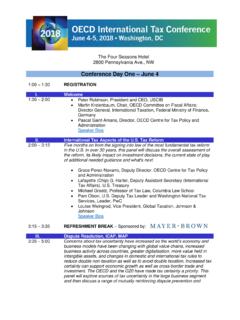Transcription of Good Governance & the Rule of Law - USCIB
1 Good Governance & the Rule of Law January 2015 Business Priorities for the Sustainable Development Goals Good Governance and the rule of law are essential preconditions for the fulfillment of the Post-2015 Sustainable Development Agenda and the proposed Sustainable Development Goals (SDGs) because they are prerequisites for peace and stability, without which societies cannot function, let alone flourish. The commitment to transparency and accountability inherent in good Governance promotes the rule of law over corruption, allowing the many benefits of other sustainable development initiatives and economic inputs to reach those in society who most need to benefit from them. Business needs the stability and predictability of good Governance to put down roots and flourish, stimulating growth and economic opportunities for others.
2 Good Governance is also an essential attribute of a profitable, sustainable and responsible business enterprise. Securing the license to operate and sustained growth require transparency and accountability in both business relationships with other enterprises and partnerships undertaken with government and civil society partners. Such partnerships at all levels of government and society will be essential to achieving the SDGs and the broader Post-2015 Development Agenda. Executive Summary Good Governance and the rule of law are essential preconditions for the fulfillment of the Post-2015 Sustainable Development Agenda and the proposed Sustainable Development Goals (SDGs) because they are prerequisites for peace and stability, without which societies cannot function, let alone flourish. The commitment to transparency and accountability inherent in good Governance promotes the rule of law over corruption, allowing the many benefits of other sustainable development initiatives and economic inputs to reach those in society who most need to benefit from them.
3 Business similarly needs the stability and predictability of good Governance to put down roots and flourish, stimulating growth and opportunities for others. Measurable and sustained progress on all of the SDGs will only be achieved in those countries that have sufficient enabling conditions in place, such as transparent, participatory and accountable institutions governed by the rule of law and predictability in legal and regulatory frameworks, including clear and secure property rights, well-managed public administration and services and functioning judicial systems. For many economies overwhelmed by informality, achieving the SDGs will also depend on transitioning to more formal institutions, including robust provision of legal identity and business registration. If societies and the economic activity of their people cannot be seen by the state, the state cannot strategically govern to better their lives.
4 Good Governance is also an essential attribute of a profitable, sustainable and responsible business enterprise. Securing the license to operate and sustained growth require transparency and accountability in both business relationships with other enterprises and partnerships undertaken with government and civil society partners. Such partnerships at all levels of government and society will be essential to achieving the SDGs and the broader Post-2015 Development Agenda. business has unsurpassed ability to assemble people, capital, management and innovation and provide productive jobs, goods and services, but to catalyze the power of business to contribute to the Post 2015 Development Agenda, governments must rule with good Governance . USCIB offers 3 recommendations for international cooperation to strengthen Governance in the public and private sectors and catalyze achievement for all the SDGs: Build capacity: Prioritize strengthening and capacity building of national institutions tasked with implementing the post-2015 development agenda.
5 We encourage the HLPF to hold periodic structured dialogues to share good practices and encourage public-private partnerships. Combat informality: Address informality to benefit individuals (civic identity) and businesses (title) thereby increasing their access to finance and providing governments with more robust data and an expanded tax basis with to govern. Open Up Governance : Engage business and other stakeholders in national and international sustainability Governance . Substantive engagement by the private sector to inform agenda setting, policy formulation and implementation will complement government actions. Good Governance & the Rule of Law Page 1 Business Priorities for the Post-2015 Sustainable Development Agenda: Good Governance & the Rule of Law DEFINING GOOD Governance & THE RULE OF LAW Good Governance starts from a recognition that the nation, institution or enterprise is operated for the benefit of others, with an obligation of accountability.
6 Leaders are entrusted with authority to manage in order to deliver benefits to their citizens, recipients or shareholders, but they must have the courage, humility and self-control to put in place checks on their authority. In short, governments must be epitomized by predictable, open and enlightened policy making; a bureaucracy imbued with a professional ethos; an executive arm of government accountable for its actions; and a strong civil society participating in public affairs; and all behaving under the rule of law. 1 The United Nations defines the rule of law as a principle of Governance in which all persons, institutions and entities, public and private, including the State itself, are accountable to laws that are publicly promulgated, equally enforced and independently adjudicated, and which are consistent with international human rights norms and standards.
7 It requires, as well, measures to ensure adherence to the principles of supremacy of law, equality before the law, accountability to the law, fairness in the application of the law, separation of powers, participation in decision-making, legal certainty, avoidance of arbitrariness and procedural and legal transparency. 2 The World Development Report long ago identified the key elements of good Governance : Internal rules and restraints (including internal accounting and auditing systems, independence of the judiciary and the central bank, civil service and budgeting rules); Voice and partnership (including mechanisms for public deliberation of proposed laws and the enabling of partnerships among different actors in society); and Competition (including competitive social service delivery and private participation in infrastructure).
8 3 These attributes of good Governance are ultimately reflected in the extent to which the security and prosperity of individuals is being well-served by their governments. At a bare minimum, good Governance with accountability and transparency is a foundation for peace and stability, without which all of societies greater aims cannot be achieved. Indeed, because public services (such as in health, transport, and education) account for much of a country s economic activity, effective public service delivery is integrally tied to economic growth. 1 World Bank, Governance : The World Bank s Experience (1994). 2 Report of the Secretary-General, The rule of law and transitional justice in conflict and post-conflict societies (2004). 3 World Development Report (1997). Good Governance & the Rule of Law Page 2 As the proceeds to enhance and upgrade its international cooperation and national action for development that is sustainable, business expects that the basic underpinnings of Governance to be strengthened and integrated accordingly.
9 Business also understands that its own Governance practices need to be considered in this new emerging paradigm, both within individual companies operations and as part of the international community. GOOD Governance & THE RULE OF LAW AS CATALYSTS FOR ACHIEVING THE POST-2015 SUSTAINABLE DEVELOPMENT AGENDA The 17 Sustainable Development Goals currently proposed establish an ambitious agenda for humanity with the aim of improving all aspects of life in all countries, regardless of developmental status. All Member States progress in development will be measured against these goals in the future. While achieving these outcomes seems daunting, they will be far easier to reach and on a more expeditious schedule if they are accompanied by improvements to Governance and the rule of law. Those countries that have accountable institutions and enabling conditions in place, including the close involvement of the private sector in meaningful ways, will see the most gains in achieving the SDGs targets.
10 On the contrary, the SDGs will not be achieved unless significant Governance improvements are first implemented and continually refined. Business applauds the outcome document of the Open Working Group for its inclusion of good Governance and the rule of law as priorities in the Post-2015 Sustainable Development agenda. As the outcome document notes, Rio +20 reaffirmed the need for the post-2015 development agenda to be guided by, among other important principles, the rule of law and good Governance as well as an overall commitment to just and democratic societies. Noting that the role of national policies, domestic resources and development strategies cannot be overemphasized, the outcome document also emphasizes that [g]ood Governance and the rule of law at the national and international levels are essential for sustained, inclusive and equitable economic growth, sustainable development and the eradication of poverty and hunger.








